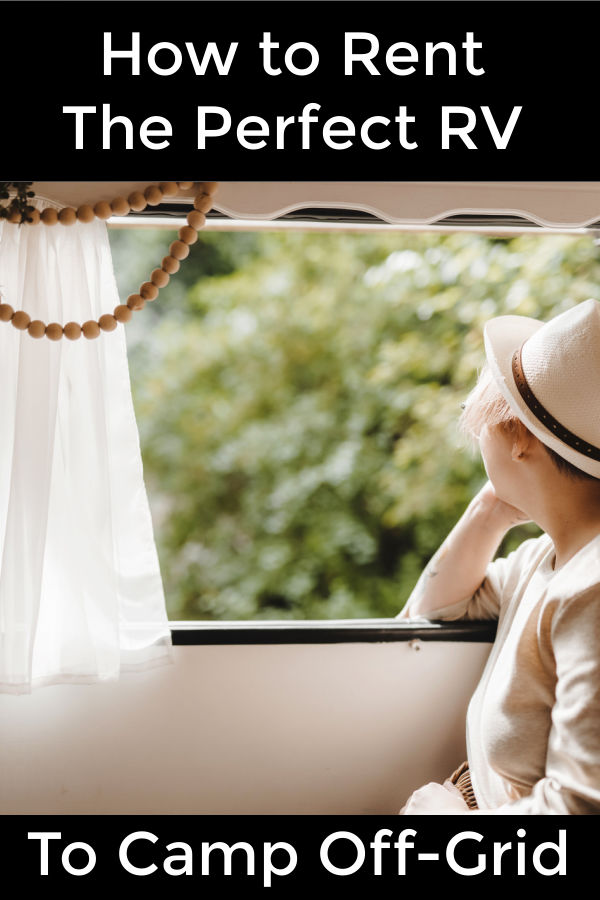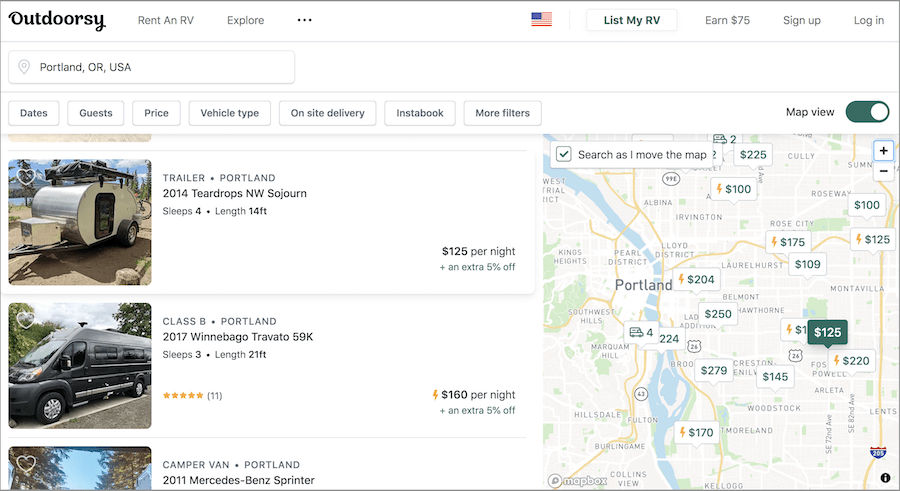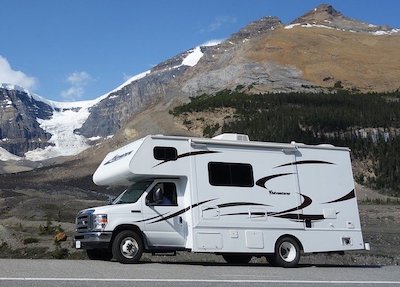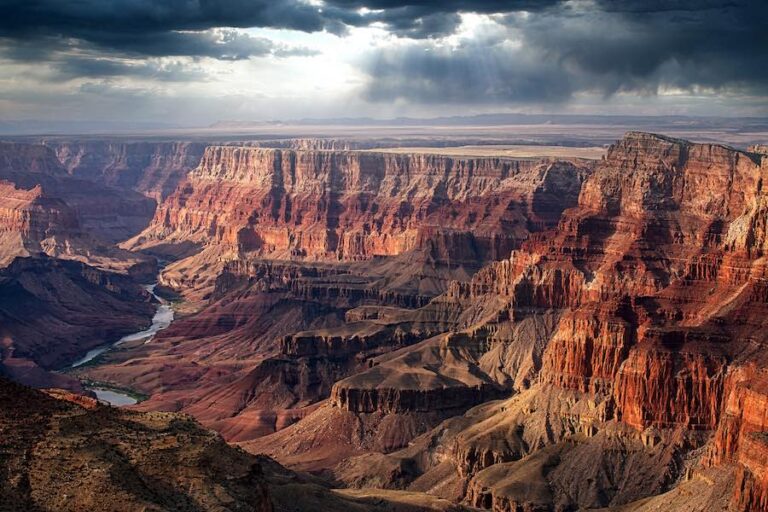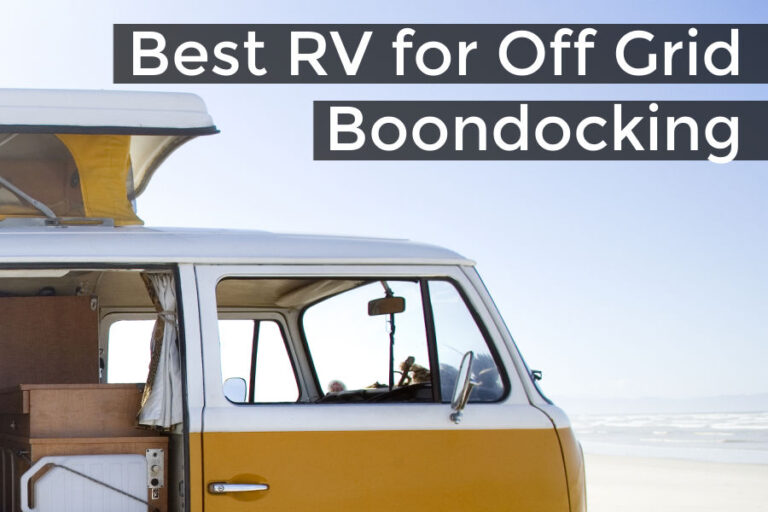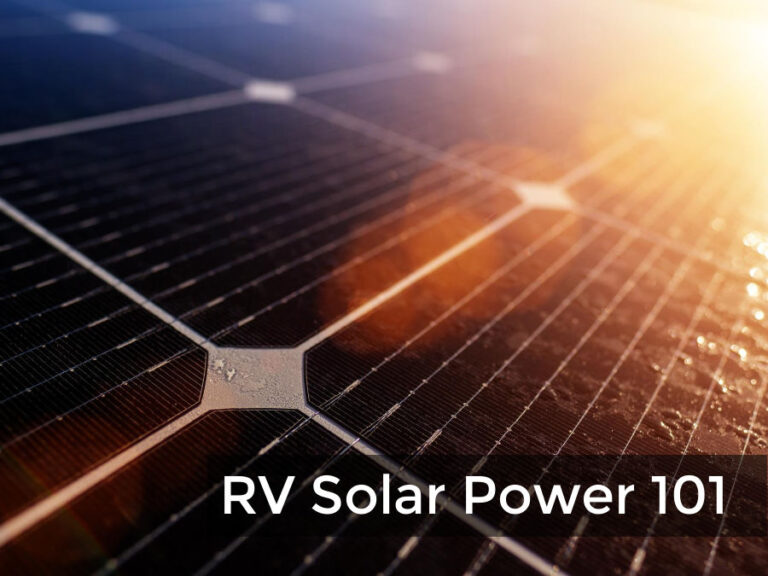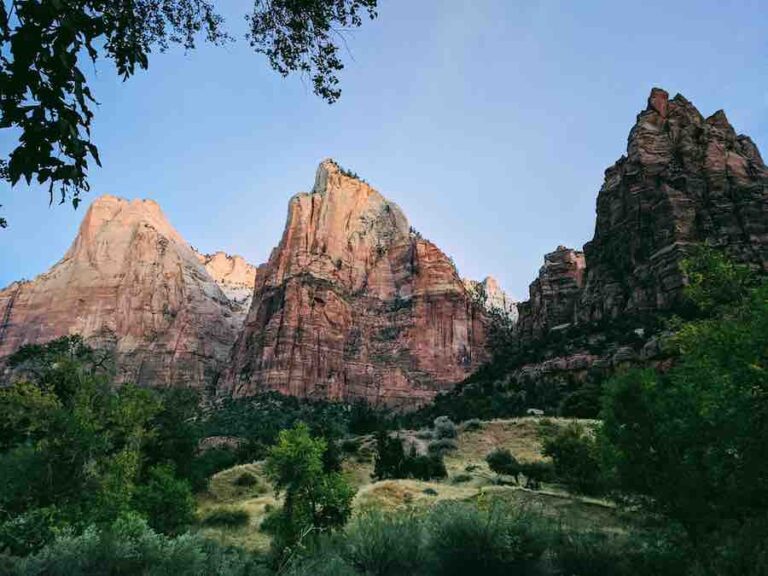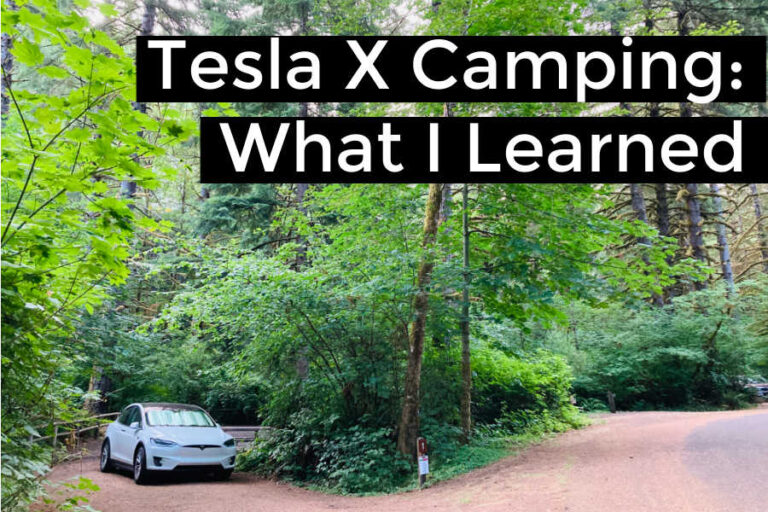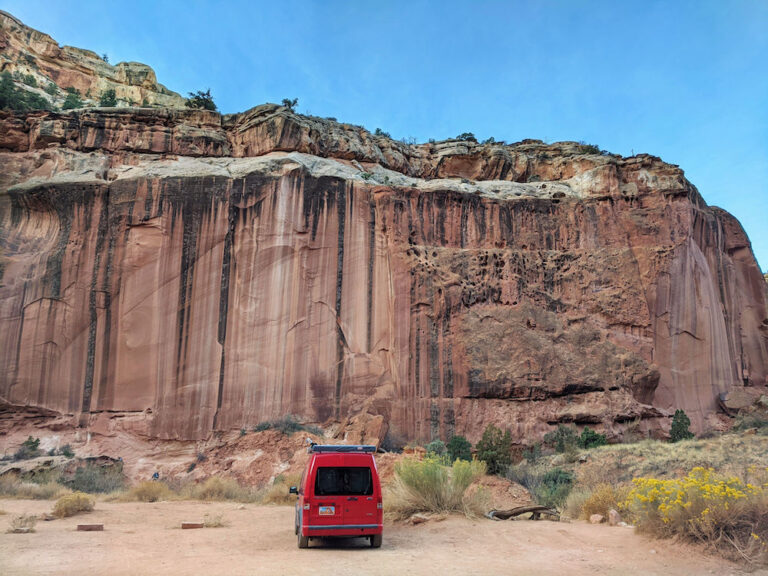How to Rent a Solar Power or Off Grid RV, Camper, or Trailer
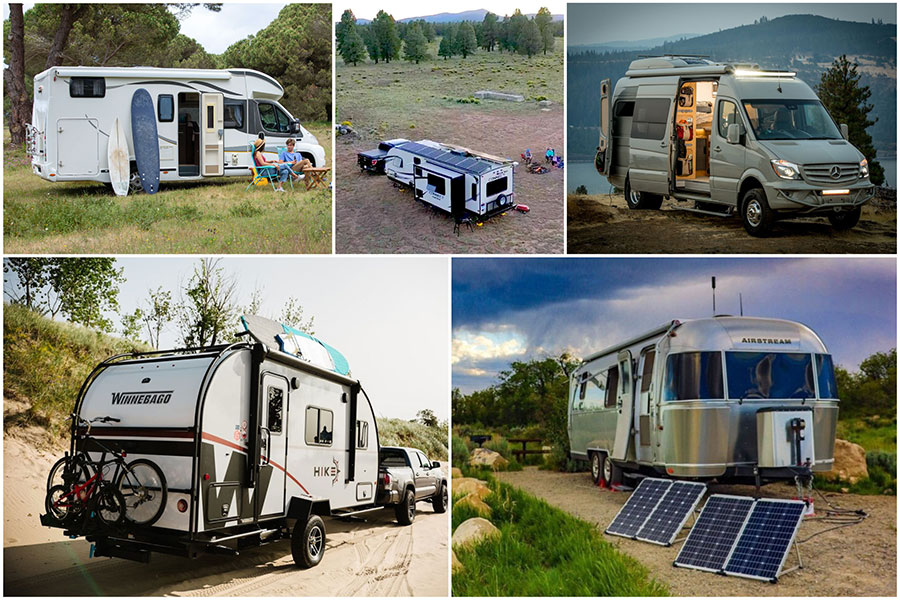
So you want to go off-grid camping but aren’t sure what kind of RV you should rent? Or maybe you’ve been RV camping for years in campgrounds and you’re interested in giving boondocking a shot, but you’re not sure where to start.
This article will help you with planning your boondocking experience! We’ll share everything from our resources on finding off-grid RV rentals, tips on choosing the right rental, and how to plan your road trip routes and itinerary.
What RV rentals can go boondocking?
Boondocking can also be referred to as “dry camping“, “wild camping“, “dispersed camping” or “off grid camping.” Of course, you can use solar panels or camp off the grid even in a developed campground or a parking lot.
To camp in an RV without connecting to electricity, sewer, or water for any length of time requires a rig that can be self-sufficient.
This usually means using batteries with the assistance of either a gas generator or solar panels. Fresh water tanks, grey water storage, and waste storage are also key when camping off grid.
Gas generators are loud and cumbersome, which isn’t great for peaceful travels or sustainability. That’s why we recommend looking for an RV rental with solar power if you want to go off-grid. Solar panels convert sunlight into energy and store it in a battery to be used when needed.
Depending on how much electricity you need to run appliances, portable solar units or solar panels installed on top of the RV can power most of your needs. These days more and more RV rentals are available with solar power, especially on sites like Outdoorsy.
Benefits to RV boondocking or off grid camping include:
- the freedom to camp in places others may not be able to because you’re self sufficient
- saving money on campground fees
- getting away from the crowds
- more connection with nature
- in the case of solar panels: fewer emissions for low impact, environmentally-friendly camping
How much do RV rentals with solar cost?
When thinking about renting a RV with solar, the cost is most likely one of the first things you’re taking into account. What is the average cost for a week? How does it compare to staying in a hotel?
The price can depend on many things, such as the type of RV you choose or the rental market in your area. For Portland, Oregon, the price on Outdoorsy ranges from $130 per night to over $300 for larger campervans.
Weekly rental discounts are fairly common but on the whole, the cost can end up being similar to staying in a hotel. But keep in mind that the rental costs are not per person. So if you are off grid camping with your family or a big group, then you can end up saving on costs.
How do I find an off-grid RV rental near me?
With the rise in popularity of RV boondocking, finding off-grid motorhomes, caravans, or trailers with RV solar systems can be easily done through various RV rental companies.
Some popular RV rental websites are Outdoorsy and RV Share. Both follow the sharing economy model. Think of Airbnb but for RVs!
We’ll be covering how to use Outdoorsy since we have more experience using it. Outdoorsy is particularly great for finding the best off-grid rental RV since you can filter search results by amenities like “solar panels.”
Enjoy $50 off your Outdoorsy rental with discount code: intentional
Browse all RVs, trailers, motorhomes, and campervans on Outdoorsy >
How Outdoorsy Works
As we mentioned, Outdoorsy works very similarly to Airbnb. You’ll find listings posted by RV owners of their rigs, complete with pictures, descriptions, and a list of amenities. After browsing through the listings, you can submit a rental request for your chosen dates.
The first step to renting is completing a driver and identity verification process in order to qualify for Outdoorsy’s episodic insurance protection. This protects you for your entire journey, from the moment you depart to the moment you return.
After completing this process and accepting the owner’s rental confirmation, you then pay a deposit to hold the rental.
The remainder of the rental value is paid 14 days prior to your chosen departure date. The security deposit, which is determined by the RV owner, is collected 48 hours prior departure.
You can coordinate with the owner to pick up the rig or have it delivered. The owner will walk you through all the details of the RV to make sure you understand how to operate it before doing the key exchange.
Upon returning the RV to the owner, you’ll go through a final inspection to make sure everything is in the same condition you received it. Once everything checks out, you’ll get your security deposit back via the Outdoorsy app.
Benefits of renting with solar on Outdoorsy:
- Access to unique listings of RVs, vans, and trailers
- Availability in the United States, Canada, the UK, Germany, Italy, France, Spain, Australia and New Zealand
- Cheaper to rent than traditional RV rental companies and dealerships
- Easy to use website
- Simple, secure booking and money transfer process
- Roadside assistance
- Protection packages through Lloyds of London and Liberty Mutual
- Top-rated 24/7 customer service in the industry
What to know before renting Outdoorsy RVs:
Here are some important things to know before renting an RV through Outdoorsy.
First, keep in mind that everyone will have a different experience since it’s a peer-to-peer platform. Your rental experience will all depend on the rig you rent and who you rent it from.
Secondly, any on-site repairs or purchase of any parts during the rental period, will be covered by you as the renter.
Lastly, any extra add-on services like linens delivery or tank dumping may be added to your total cost.
Browse and book solar campervans on Outdoorsy here
*Take $50 off with discount code: intentional
Important RV Rental Tips
When you plan on renting an RV, the first thing you should consider is the type and size of RV that best suits your needs. There are three main types of RVs to choose from: Class A (21-40 ft in length), Class B (16-22 ft in length), and Class C (21-35 ft in length).
With off grid camping, you need to look for certain features like larger holding tanks, off-road capability, and self-sufficient systems like solar panels.
Before choosing your RV, make sure to clarify anything that isn’t clear from the listing with the owner. It’s best to do any communications through the Outdoorsy platform so customer service can step in at any time.
Here are some important questions you should take into account when choosing your RV:
- Dimensions – What are the exact dimensions of the RV? (Because the size may restrict you from accessing certain roads or campgrounds.)
- Mileage – How many miles are included in the rental?
- Amenities – What are the amenities included in the total cost?
- Extra services – Are linens included or do you need to bring your own bedding and towels?
- RV maintenance/operations – When was the RV last serviced or is it due for its next service soon? Does the rental include roadside assistance?
After choosing and picking up your RV, make sure that the owner walks you through how everything works.
Here are some important questions you should cover before you embark on your journey:
- RV maintenance – When were the tires last checked? What should the tire pressure be and how can it be checked?
- Fuel – What type of fuel does the RV use?
- Electricity – How do I use the solar system to charge my devices? How many solar panels are there and what’s their capacity?
- Water – What kind of water storage system does the RV have?
- Waste – How much waste can the RV store?
- Insurance – Where can I find proof of insurance and the owner’s manual?
- Contact information – Who should I be in touch with in case of any issues?
- Security deposit – After the rental period, what must be done on my part in order to get my security deposit back?
Planning Your Off-Grid RV Road Trip with Solar
Another thing that can help you in choosing what RV to rent is planning your route and destination.
When driving RVs, keep in mind that some roads have height restrictions. Apps like CoPilot help you prevent any run-ins with propane-restricted tunnels or low bridges by suggesting the best possible routes according to the size and class of vehicle. It’s especially useful for boondocking since you can use it offline!
There are other apps available you can use like Roadtrippers. But if you want to create your own road trip route, check out how to plan a roadtrip using Pinterest and Google Maps.
With boondocking, we also recommend buying a physical map in case you won’t have service or to preserve your phone’s battery.
Taking that further, you must also plan ways on maximizing and preserving energy off-grid. Here are some helpful tips:
- When using solar panels, camp in open spaces with direct sunlight
- If using portable panels, move them throughout the day to point to the sun
- Find places with neutral climates to camp in
- Minimize use of AC or heating
- Look for rigs with LED lighting and high-efficiency appliances
- Try to do things manually instead of using electricity as much as possible
- Charge your devices only when you’re not using them
How to estimate gas costs for your RV road trip
After preparing your itinerary and route, you’ll have a better idea of the distance you’ll be covering.
First, ask the owner or do your own research to find out the average mpg (miles per gallon) of your rental RV. With this information, you can roughly estimate how much to budget for gas using the following formula:
Total driving distance (miles) ÷ RV’s mpg = number of gallons of gas you’ll need
Number of gallons X average gas price = total gas budget
How to find campsites for boondocking
An important aspect of camping off-grid is to “leave no trace.” Make sure that you’re fully equipped and familiar with your water, power, and waste systems. There are various resources you can check to find campsites for boondocking.
- The U.S Forest Service (USFS) website is good for finding free and paid camping sites in public land and national forests.
- Campendium and iOverlander are intuitive, modern platforms with user reviews that help you find both overnight spots and beautiful locations in nature for longer stays.
- Lastly, you can also always turn to Google Maps Satellite View to examine your surroundings and find nearby campsites.
Outdoorsy is like Airbnb for RVs. It’s where RV owners rent out their RVs when they’re not using them.
If you’ve always wanted to try out a motorhome, or want to upgrade your National Parks road trip with a cute Airstream, consider renting through Outdoorsy. Their customer service and reviews have outranked the other top RV rental companies. You can search listings by vehicle type and location. Some owners will even deliver the motorhome to your door!
*Take $50 off your Outdoorsy rental with coupon code: intentional
Browse and book RVs, motorhomes, trailers, and campervans on Outdoorsy here
Boondocking is a great way to go camping and experience nature. To make the most out of your off-grid camping experience, it’s all about finding the best rental for your needs and knowing how to prepare for your road trip.
Like this article? Pin it for later or share with friends!
